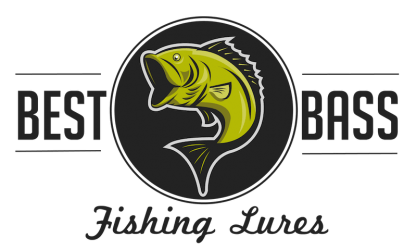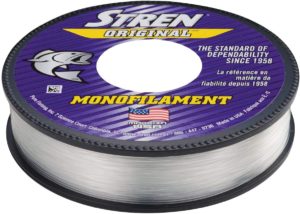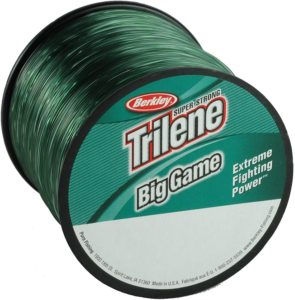The oldest and most well known fishing line still used today is called Monofilament, or “mono” for short. It’s the line most fishermen grew up using and are most comfortable with. But it’s the line’s cooperativeness that makes it so popular. That, and how well it works with certain bass lures.
Made up of mostly nylon, monofilament is a flexible and stretchy material. These properties make the line very manageable, and less prone to tangling like it’s more rigid alternative; fluorocarbon. But at the same time these properties make mono the least sensitive of all fishing lines.
When choosing fishing line, you are comparing the pros and cons of the three types of fishing lines that are available. Here are two of the best monofilament lines. Stren Original for standard situations and Trilene Big Game for when you need more strength.
Mono Specifications
- Most Stretch
- Most Buoyant
- Most Abrasion Resistant
- Low Visibility
- Lowest Sensitivity
Best Lures For Mono
One of the biggest attributes of mono is that it floats. This feature makes it better for certain lures or desired presentations. Most obviously, topwater lures work best with mono, especially slow moving topwaters.
Its buoyancy however makes mono less efficient at getting sinking lures down in the water column. Mono also has a thicker diameter, adding to its resistance in the water and making it even harder to get sinking or diving lures down. However, the thicker diameter gives it more abrasive strength.
This is a nice tradeoff when you’re not as concerned with sink rate. You might be fishing areas where the line can rub against rocks and the increased abrasive strength is more beneficial to have. Added to the fact that bass have coarse mouths that can wear on fishing line during the fight.
Remember that any lure can be used with any type of line, it’s a matter of what you want the lure to do. For example you might fish a suspending jerkbait with mono if you want to keep it up or flouro if you want to keep it deeper in the water column. Here is a list of lures and the recommended monofilament pound-test to use with them.
| Lures | Pound-Test |
|---|---|
| Jerkbaits | 8-14 lbs |
| Frogs | 25 lbs |
| Punch Rigs | 20 - 30 lbs |
| Small Swimbaits | 8 - 14 lbs |
| Big Swimbaits | 20 - 25 lbs |
| Glides | 20 - 25 lbs |
| Spinnerbaits | 14 - 20 lbs |
| Buzzbaits | 14 - 20 lbs |
| Umbrella Rigs | 17 - 25 lbs |
| Casting Jigs | 25 lbs |
| Swim Jigs | 15 - 20 lbs |
| Vibrating Jigs | 12 - 20 lbs |
| Finesse Jigs | 6 to 10 lbs |
| Shaky Heads | 6 to 10 lbs |
| Drop Shot | 6 to 10 lbs |
| Ned Rig | 6 to 10 lbs |
| Shallow Crankbaits | 10 - 20 bs |
| Deep Diving Crankbaits | 10 - 20 lbs |
| Lipless Crankbaits | 10 - 20 lbs |
| Poppers | 10 - 20 lbs |
| Walk The Dog Baits | 10 - 25 lbs |
| Small Rubber Worms | 6 - 12 lbs |
| Big Rubber Worms | 14 - 20 lbs |
| Tubes | 6 - 12 lbs |
| Underspins | 14 - 20 lbs |





